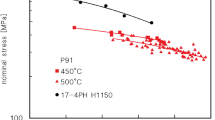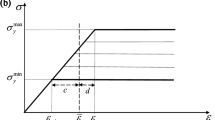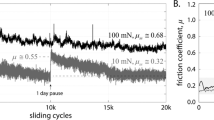Abstract
IN a paper published last year1, we showed with poly crystalline lead, subjected to a constant simple shear stress, that the t 1/3 law of creep held very closely within a certain range of strain, the average error being about 0.25 per cent of the range in question. We recorded, however, that for low strains, below about 0.03 with a particular lead, the law was not obeyed, the strain varying more rapidly than was indicated by the law. At high strains, too, the law fails owing to recrystallization, but to comment on that is not the object of the present communication.
This is a preview of subscription content, access via your institution
Access options
Subscribe to this journal
Receive 51 print issues and online access
$199.00 per year
only $3.90 per issue
Buy this article
- Purchase on Springer Link
- Instant access to full article PDF
Prices may be subject to local taxes which are calculated during checkout
Similar content being viewed by others
References
Andrade, E. N. da C., and Jolliffe, K. H., Proc. Roy. Soc., A, 254, 291 (1960).
Andrade, E. N. da C., Nature, 187, 494 (1960).
Author information
Authors and Affiliations
Rights and permissions
About this article
Cite this article
ANDRADE, E., JOLLIFFE, K. Creep of Metals under Simple Shear. Nature 190, 431–432 (1961). https://doi.org/10.1038/190431b0
Issue Date:
DOI: https://doi.org/10.1038/190431b0
Comments
By submitting a comment you agree to abide by our Terms and Community Guidelines. If you find something abusive or that does not comply with our terms or guidelines please flag it as inappropriate.



